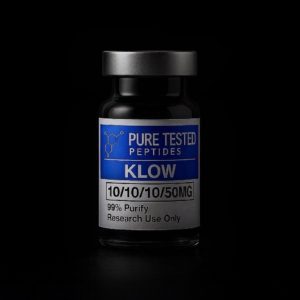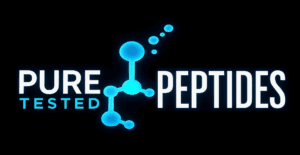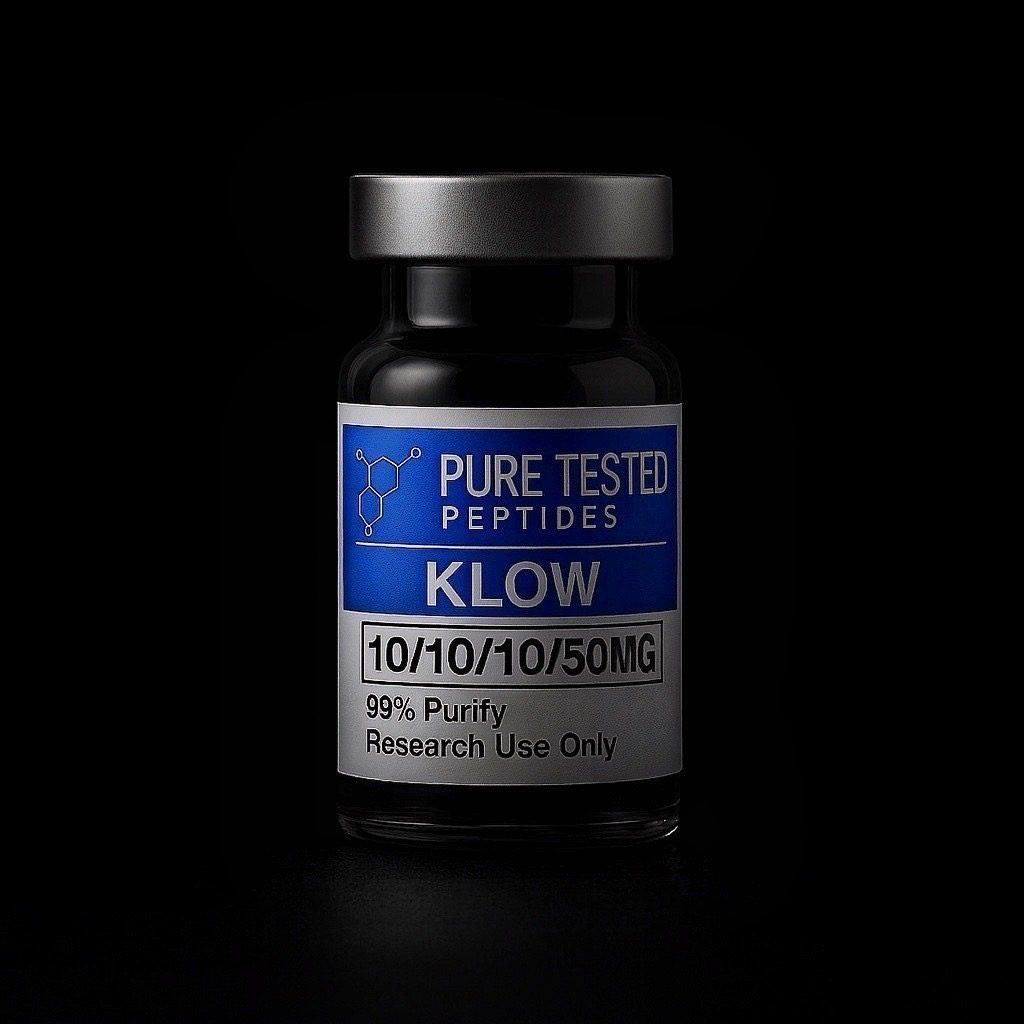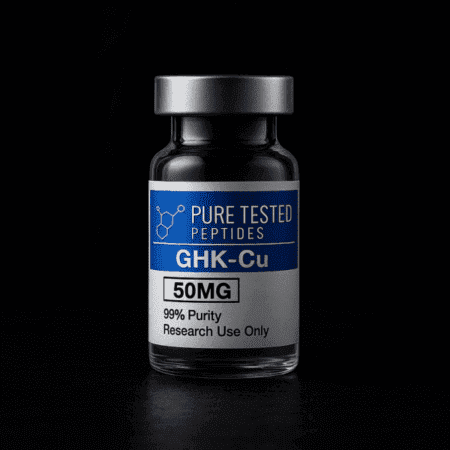Description

KLOW Peptide Blend
Mechanism of action and evidence summary with links to PubMed/PMC. Educational only—no medical advice or therapeutic claims.
GHK-Cu
CAS NO: 49557-75-7
Molecular Formula: C14H24N6O4
Molecular Weight: 340.39
TB-500 (TB-4) 43 amino acid chain
CAS NO: 77591-33-4
Molecular Formula: C212H350N56O78S
Molecular Weight: 4963 g/mol
BPC-157
CAS NO: 137525-51-0
Molecular Formula: C62H98N16O22
Molecular Weight: 1419.54
Overview & Positioning
KLOW denotes a research-oriented combination of four peptides: BPC-157, TB-500 (a thymosin-beta-4–based agent), GHK-Cu (glycyl-L-histidyl-L-lysine copper complex), and KPV (Lys-Pro-Val; an α-MSH–derived tripeptide). Peer-reviewed literature primarily investigates each component individually; comprehensive studies on the four-peptide blend are limited. The sections below summarize reported mechanisms and representative studies.
Mechanism of Action — Component Detail
BPC-157 (pentadecapeptide)
- Angiogenic signaling (VEGFR2 → Akt → eNOS): Endothelial and ischemia models report VEGFR2 involvement with downstream Akt/eNOS activation and tube formation. PubMed 27847966
- NO-dependent vasomotor modulation: Isolated aorta experiments describe nitric-oxide–linked effects on vascular tone and Src/Caveolin-1/eNOS interactions. PMC7555539
- Tendon-cell signaling: Increased growth-hormone receptor expression and enhanced GH-evoked JAK2 activation reported in tendon fibroblasts. PMC6271067
- Contextual reviews: Described within cytoprotection/adaptive cytoprotection frameworks. PMC7096228
TB-500 / Thymosin-β4 (Tβ4)
“TB-500” is commonly used in research contexts for Tβ4-based materials; citations reference Tβ4 in the scientific literature.
BPC-157 • TB-500/Tβ4 • GHK-Cu • KPV
- Actin dynamics & cell migration: Tβ4 binds G-actin (LKKTETQ motif), associated with endothelial/keratinocyte migration and tubule formation. PubMed 14500546
- PI3K/Akt/eNOS axis & EPC function: Studies in endothelial-progenitor cells report Akt/eNOS activation and improved tube formation under stress. PMC6143828; PubMed 29956769
- Epithelial repair models: Corneal and dermal wound models describe enhanced re-epithelialization and migration. PMC2701135; PubMed 11950239
GHK-Cu (glycyl-histidyl-lysine:copper)
- ECM remodeling: Low-nanomolar stimulation of collagen and glycosaminoglycan synthesis; modulation of MMP/TIMP balance. PubMed 3169264; PubMed 11045606
- Gene-program regulation: Transcriptomic work reports shifts toward repair-associated signatures and antioxidant pathways. PMC5332963; PMC4508379
- Inflammation/oxidative stress models: Preclinical studies describe modulation of TGF-β/Smad and NF-κB-related signaling in injury contexts. PubMed 31809714
KPV (Lys-Pro-Val; α-MSH–derived tripeptide)
- NF-κB pathway modulation: KPV has been reported to reduce NF-κB activation/nuclear translocation in epithelial models. PubMed 11256945
- PepT1-mediated epithelial uptake: In colitis models, uptake through di/tripeptide transporter PepT1—upregulated during inflammation—has been implicated in local activity. PMC2431115
- Melanocortin-receptor context: Some effects appear partially independent of MC1R; airway epithelium work implicates MC3R-linked signaling. PMC3403564; PubMed 18092346
Mechanistic Complementarity (Blend Rationale)
Viewed as a research hypothesis, the four components cover complementary biological nodes:
- Endothelial dynamics & perfusion: BPC-157 (VEGFR2→Akt→eNOS; NO homeostasis) and Tβ4 (actin-guided migration; PI3K/Akt/eNOS) address vascular signaling and cell motility.
- Matrix remodeling & structure: GHK-Cu is associated with collagen/GAG synthesis and MMP/TIMP balance; Tβ4 supports cytoskeletal organization and epithelial migration.
- Inflammatory set-point & mucosal interface: KPV engages NF-κB-related pathways and PepT1-mediated epithelial uptake; BPC-157 is discussed in cytoprotection contexts.
These intersections are hypothesis-generating based on component data; they do not establish blend-level outcomes.
Evidence Snapshot (preclinical/early)
- BPC-157: Angiogenic signaling and blood-flow recovery; NO-dependent vasomotor effects; tendon-cell GHR/JAK2 signaling.
PubMed 27847966 ·
PMC7555539 ·
PMC6271067 ·
PMC7096228 - TB-500/Tβ4: Actin-mediated migration/angiogenesis; corneal/dermal repair models; EPC Akt/eNOS under stress.
PubMed 14500546 ·
PMC2701135 ·
PMC6143828 ·
PubMed 29956769 - GHK-Cu: ECM synthesis at low nanomolar levels; gene-program modulation; inflammation/oxidative-stress models.
PubMed 3169264 ·
PubMed 11045606 ·
PMC4508379 ·
PMC5332963 ·
PubMed 31809714 - KPV: NF-κB suppression; PepT1-mediated epithelial transport; melanocortin-receptor context in airway/intestinal models.
PMC2431115 ·
PMC3403564 ·
PubMed 18092346 ·
PubMed 11256945
Selected PubMed / PMC References
-
- Hsieh MJ, et al. VEGFR2→Akt→eNOS signaling with BPC-157. PubMed 27847966
- Hsieh MJ, et al. NO-dependent vasomotor modulation by BPC-157. PMC7555539
- Chang CH, et al. GHR up-regulation & JAK2 activation in tendon fibroblasts. PMC6271067
- Sikiric P, et al. Cytoprotection/adaptive cytoprotection review. PMC7096228
-
- Philp D, et al. Actin-binding motif & angiogenesis. PubMed 14500546
- Sosne G, et al. Corneal repair & anti-inflammatory actions. PMC2701135
- Qiu F, et al. EPC function via Akt/eNOS with Tβ4. PMC6143828
- Zhao Y, et al. VEGF expression & EPC paracrine effects. PubMed 29956769
-
- Maquart FX, et al. Collagen synthesis stimulated by GHK-Cu. PubMed 3169264
- Siméon A, et al. ECM/MMP-2 modulation by GHK-Cu. PubMed 11045606
- Pickart L, et al. GHK-Cu as gene-program modulator (reviews/data). PMC4508379; PMC5332963
- Ma W, et al. TGF-β/Smad & oxidative-stress model. PubMed 31809714
- Dalmasso G, et al. PepT1-mediated uptake & colitis models. PMC2431115
- O’Reilly PJ, et al. Airway epithelium; MC3R/NF-κB context. PMC3403564
- Kannengiesser K, et al. Colitis model; MC1R-independent aspects. PubMed 18092346
- Haddad JJ, et al. NF-κB nuclear translocation inhibition. PubMed 11256945





